接动词ing形式和不定式的动词
英语动词-ing形式作主语和宾语
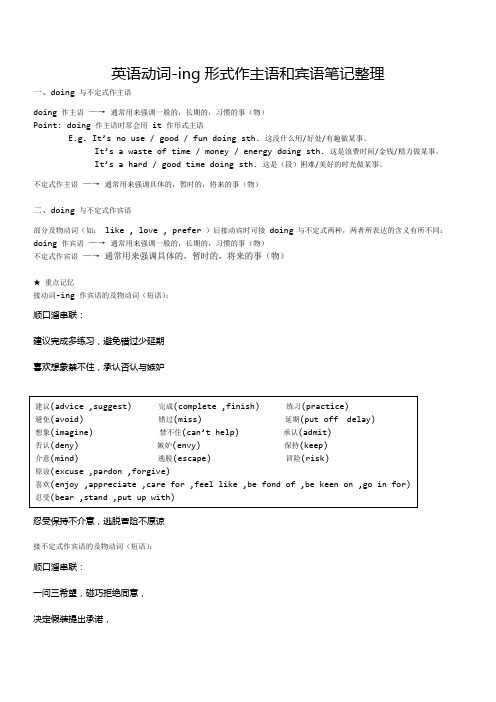
英语动词-ing形式作主语和宾语笔记整理一、doing与不定式作主语doing作主语—→通常用来强调一般的,长期的,习惯的事(物)Point: doing 作主语时常会用 it 作形式主语E.g. It’s no use / good / fun doing sth. 这没什么用/好处/有趣做某事。
It’s a waste of time / money / energy doing sth. 这是浪费时间/金钱/精力做某事。
It’s a hard / good time doing sth. 这是(段)困难/美好的时光做某事。
不定式作主语—→通常用来强调具体的,暂时的,将来的事(物)二、doing与不定式作宾语部分及物动词(如:like , love , prefer)后接动宾时可接doing与不定式两种,两者所表达的含义有所不同:doing作宾语—→通常用来强调一般的,长期的,习惯的事(物)不定式作宾语—→通常用来强调具体的,暂时的,将来的事(物)★重点记忆接动词-ing作宾语的及物动词(短语):顺口溜串联:建议完成多练习,避免错过少延期喜欢想象禁不住,承认否认与嫉妒忍受保持不介意,逃脱冒险不原谅接不定式作宾语的及物动词(短语):顺口溜串联:一问三希望,碰巧拒绝同意,决定假装提出承诺,渴望设法买得起,计划准备不失败。
接动词-ing / 不定式作宾语的及物动词:①动词love , like , hate等后跟动名词和不定式作宾语,但接动名词表示经常性的情况,接不定式表示具体的动作②动词begin , start , continue等后既可跟不定式,又可以跟动-ing形式宾语,意义基本相同③一些动词后既可跟动名词做宾语又可以跟不定式作宾语,但意义上有很大差别:三、动名词逻辑主语以及其他问题①动名词作主语时,形容词性物主代词one’s与名词所有格前置作动名词的逻辑主语,具体形式为:one’s doing②动名词作宾语时,由形容词性物主代词one’s,人称宾格与名词所有格作动名词的逻辑主语,具体形式为:vt. One’s doing③逻辑主语位于非谓语动词的最前面:E.g. his not being late.④动词-ing的肯定形式:一般时:主动:doing 被动:being done完成时:主动:having done 被动:having been done⑤动词-ing的否定形式:not + 动词-ingnot + having done not having been done(注意:not 一定位于肯定形式的最前面)⑥在need , want , require 等动词后接动名词,即用主动形式表示被动意义:need/want/require doing = need/want/require to be done。
初中英语动词后接不定式的单词和接ing的单词 -回复
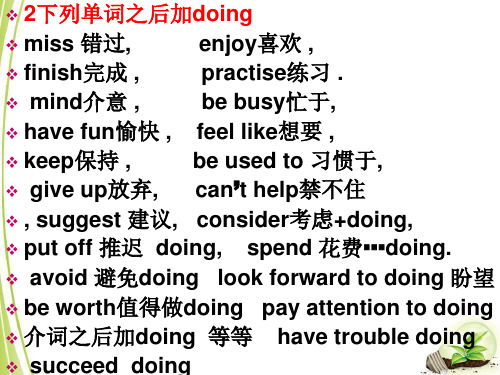
❖ 介词之后加doing 等等 have trouble doing
❖ succeed doing
❖ 3 下列单词之后加to do
❖ need需要 ,
want ,=would like想要 ,
❖ plan计划 ,
decide 决定,
❖ hope 希望.
the first to do第一个去做···.
❖ refuse to do 拒绝做。等等
❖ promise to do承诺去做, make sure to do,确保去做
❖ Have a chance to do. 有机会去做····
❖ enough to do.足够···去做 require to do 要求···
❖ prepare to do sth 准备做 it········to do 表示目的加to do
❖ 2下列单词之后加doing
❖ miss 错过,
enjoy喜欢 ,
❖ finish完成 ,
practise练习 .
❖ mind介意 ,
be busy忙于,
❖ have fun愉快 , feel like想要 ,
❖ keep保持 ,
be used to 习惯于,
❖ give up放弃, can’t help禁不住
❖ allow 允许,
invite 邀请,
❖ ask要求xpect盼望,
❖ encourage鼓励
use 使用
❖ warn警告
advise建议
happen to do 碰巧做····
offer to do主动提出
❖ manage to do 设法
try one’s best to do 尽某人最大努力
区分动词不定式和ing形式

动词后用“ING形式”还是“动词不定式”?一,有些动词即可跟ING形式,又可跟动词不定式,通常意思不一样。
最重要的动词如下advise, allow, attempt, can't bear, begin, continue, forbid, forget, go on, hate, hear, intend,like, love, permit, prefer, propose, regret, remember, see, start, s top, try, watch某些形容词的用法也这样:accustomed, afraid, certain, interested sorry, sure, used二,与remember, forget, stop, go on和regret连用时,其区别与时间有关联。
带ing 形式指的是发生较早的事(在remembering, forgetting等等之前发生的事);动词不定式指的是发生在remembering 等之后的事。
"remember + doing"指记得已经做了的事或已经发生的事。
"remember + to do"指记得需要做的事。
“forget + doing"指忘记已做的事或已发生的事。
"forget + to do"指忘记要做的事。
“stop + doing"指停下经常做或正在做的事。
"stop + to do" 指中断下来或停下来,以便做某事。
"go on + doing"指继续做一直在做的事。
"go on + to don"指变换下改做另一件事。
"regret + doing" 指对已发生的事感到遗憾。
"regret + to do" 指对将要说出的话感到歉意。
初中英语常考的动词+动词-ing和动词不定式的总结
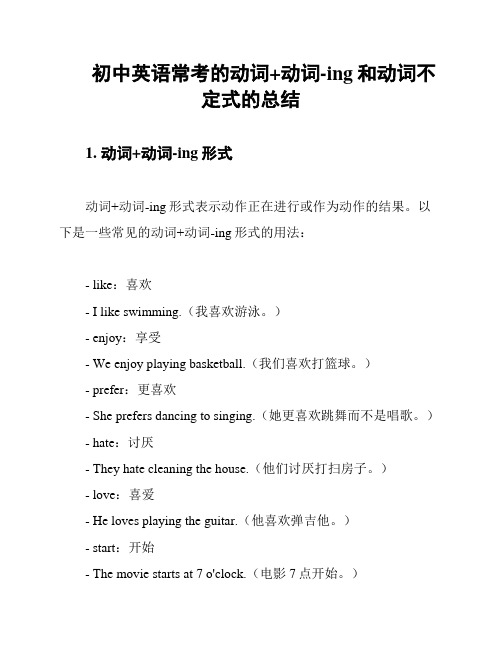
初中英语常考的动词+动词-ing和动词不定式的总结1. 动词+动词-ing形式动词+动词-ing形式表示动作正在进行或作为动作的结果。
以下是一些常见的动词+动词-ing形式的用法:- like:喜欢- I like swimming.(我喜欢游泳。
)- enjoy:享受- We enjoy playing basketball.(我们喜欢打篮球。
)- prefer:更喜欢- She prefers dancing to singing.(她更喜欢跳舞而不是唱歌。
)- hate:讨厌- They hate cleaning the house.(他们讨厌打扫房子。
)- love:喜爱- He loves playing the guitar.(他喜欢弹吉他。
)- start:开始- The movie starts at 7 o'clock.(电影7点开始。
)- finish:完成- They finished cooking dinner.(他们完成了晚饭的烹饪。
)- keep:继续- Please keep talking.(请继续讲话。
)- continue:继续- The rain continued falling.(雨一直在下。
)- stop:停止- He stopped playing the piano.(他停止弹钢琴。
)- avoid:避免- We should avoid making mistakes.(我们应该避免犯错误。
)2. 动词+动词不定式形式动词+动词不定式形式通常表示一个动作的目的、意图或计划。
以下是一些常见的动词+动词不定式形式的用法:- want:想要- decide:决定- They decided to go on a trip.(他们决定去旅行。
)- plan:计划- She plans to study abroad.(她计划出国留学。
)- hope:希望- try:尝试- He tried to solve the math problem.(他尝试解决数学问题。
初中英语动词后即可以接不定式又可以接动词ing形式

有些动词后接宾语时,既可接不定式,又可接动名词,但有区别。
如1. like to do “喜欢做某事”,指一次性动作。
如I like to swim in this river now.like doing “喜欢做某事”,指习惯性动作。
如I like swimming.类似的还有:dislike to do / doing (“不喜欢做某事”),hate to do / doing (“讨厌做某事”),love to do / doing (“热爱做某事”),prefer to do / doing (“更喜欢做某事”)。
2. remember to do “记得要去做某事” 如She remembered to see her parents the next day.remember doing “记得做过某事” 如I remembered meeting her yesterday.3. forget to do “忘了要去做某事” 如They always forget to have lunch when they are busy.forget doing “忘了做过某事” 如I forgot phoning Tom, so I phoned him the second time.4. try to do “试图(尽力)做某事” 如He tried to catch the early bus and he got on it at last. try doing “试图(试着)做某事” 如I tried getting on well with the new students.5. mean to do “打算做某事” 如Jack meant to help others.mean doing “意味着做某事” 如Drinking means wasting your life.6. need to do “需要做某事” (主语必须是人) 如We need to have a rest.need doing “需要做某事”(主语必须是物) 如The bike needs mending. ( = The bike needs to be mended)7. want to do “想要做某事” (主语必须是人) 如We want to have a rest.want doing “想要做某事”(主语必须是物) 如The bike wants mending. ( = The bike wants to be mended)8. begin to do与begin doing 都译作“开始做某事”,二者可以混用。
考向24 动词+ing和动词不定式的用法(重点)-备战2022年中考英语一轮复习考点微专题

考向24 动词+ing和动词不定式的用法(2021·吉林长春·中考真题)_________ myself, I will take up a hobby like painting this summer. A.Improve B.Improving C.To improve D.Improved【答案】C【详解】句意:为了提高自己,今年夏天我将从事绘画这样的爱好。
考查非谓语。
空格处表达的是目的,表示“为了……”,应用不定式作目的状语,故选C。
本题考查点是非谓语动词的用法动词不定式可以作宾语、宾语补足语、主语、定语,也可作目的状语等,但此题是作目的状语,表示为了.......; 但要与“祈使句+ and/ or +一般将来时的句子”,同学很容易错选A答案。
动词不定式和动词+ing的用法一、动词不定式1.动词不定式作宾语。
1)在动词want ,hope,would like,decide,wish,choose,try ,need等后常用动词不定式作宾语。
I hope to hear from you soon .2)think/find /feel /make it + adj + to do sthHe found it difficult t o get to sleep.3).stop to do sth / stop doing sthstop to do sth 停下来去做某事stop doing sth 停止正在做的事。
After working for a long time , He has to stop to have a rest .He was very tired , so he had to stop working.2.动词不定式作宾语补。
1).带to的不定式作宾补的动词有:ask / like /would like /teach /tell /want /help +sb +to do sth Please ask him to come quickly.2).省掉to的不定式作宾补的动词有:let /make / hear /see /notice /have/watch+sb +do sth 注:省掉to的不定式的句子变被动语态时,需要还原to .He made the baby stop crying .The baby was made to stop crying.3.动词不定式作主语1).动词不定式常可用作句子的主语时,谓语动词用单数形式。
后面可以跟ing形式的动词

Chapter 2 VerbsThe main content:1.后面可以跟ing形式的动词,2.“动词+宾语+介词+ing 分词”结构,介词多为,或是“动词+宾语+ing”.3.动词既能直接跟ing分词结构,也能直接带that4. 可以跟不定式的动词.5.动词即能直接跟不定式,又能跟that分句6.动词可跟宾语+动词不定式7.某些动词可以用,也可以用动词不定式8.动词不定式的其他用法1. 后面可以跟ing形式的动词appreciate ,avoid ,acknowledge ,advise ,advocate ,anticipate ,burst out ,consider ,contemplate ,help ,can’t resist ,can’t stand ,defer ,delay ,deny ,detest ,dislike ,don’t mind ,discontinue ,enjoy ,envy ,escape ,excuse ,ensure ,evade ,face , fancy ,favor ,finish ,forbid ,forgive ,facilitate ,feel ,like ,give up ,imagine ,involve ,include ,keep(on) ,leave off ,loathe ,mention ,mind ,miss ,pardon ,postpone ,practice ,put off ,permit ,ponder ,prevent ,quit ,resent ,report ,risk ,recall ,rec ollect ,recommend ,repent ,resist ,resume ,suggest ,stop ,tolerate ,u nderstand admit,等,例如:1 I can’t resist bargaining .2 Carlos just missed being caught .3 Please pardon my disturbing you .4 We appreciate your inviting us to your party .5 I hope you didn’t contemplate coming with us on this trip .6 She said she had always detested seeing a bullfight .7 They denied giving any further information to help the police .8 I hope that by posting the final six pages now at mid-day I shall ensure your receiving them before the weekend proper .2.其中有些动词不能直接带ing分词,是“动词+宾语+介词+ing 分词”结构,介词多为,或是“动词+宾语+ing”trick ,mislead ,shame ,surprise ,talk ,trap ,cajole ,keep ,blackmail, coerce ,deceive ,fool ,stop ,prevent ,hinder ,save ,dislike ,imagine, spend ,see ,appreciate ,ensure ,mind ,insist on等,例如:1 He tricked her into marrying him by pretending that he was rich .2 Do n’t let his friendly words mislead you into trusting him .3 I shamed him into returning the stolen money .4 He sudden question surprised him into betraying himself .5 Bob talked us into walking home with him .6 She trapped him into admitting that he licked her .7 Nothing would stop me from achieving my ambition .8 There was nothing to prevent her from doing so .9 What kept you from joining me ?10 Don’t let me hinder you from doing .11 He could hardly restrain himself from shouting aloud .12 A sailor saved him from drawing .13 I dislike people telling me what to think.14 I can’t imagine him working in an office .15 Would you rather spend time gardening or spend money paying somebody to do it for you ?16 Did you see her talking to the postman ?3.有些动词既能直接跟ing分词结构,也能直接带thatacknowledge ,admit ,advocate ,anticipate ,appreciate ,deny ,fancy ,im agine ,suggest ,mean(entail) ,mention ,propose ,recall ,recollect ,un derstand1 The watchman reported finding the door open .or The watchman reported that he had found the door open .2 He anticipated getting much pleasure from the reading of that book . or He anticipated that he would get much pleasure from the reading of that book .4.下面可以跟不定式的动词agree ,aim ,apply ,arrange ,advise ,allow ,afford ,appear ,ask , attempt,bear ,begin ,continue ,choose ,claim ,beg ,care ,consent , contrive ,dare,decide ,decline ,demand ,deserve,desire,determine ,exp ect,fail,fear,forbid,forget,go,go on ,guarantee ,help ,hesitate ,hope ,hate ,hear ,learn ,intend ,lick , pledge,plot,neglect,pray,prepare,long,happen ,manage ,mean ,pretend , promise ,prefer ,permit ,propose ,refuse ,resolve ,regret ,remember , seek ,swear ,see ,start ,stop ,think ,try ,watch ,undertake ,seem ,ve nture ,trouble ,volunteer ,vow ,want ,wish等,例如:1 We must agree to differ .2 I aim to finish it tomorrow .3 Last year he applied to retire .4 I have arranged to see them tomorrow morning .5 She chose to go and teach in the countryside .6 He claimed to be the owner of the car .7 He demanded to be told everything .8 We always desire to line in pace with our neighbors9 I determined to be bold and tell the truth .10 He hope to visit France this year .11 You ought to learn to be patient .12 They pledged to learn from each other .13 They are busy preparing to take the final examination .14 We mustn’t pretend to know what we don’t know .15 I don’t profess to know anything about poetry .16 They sought to punish him for his crime ,but he escape .17 He snore to tell the truth .18 The rascal threatened to kill Larry .19 Hamlet vowed to revenge his dead father .5.有些动词即能直接跟不定式,又能跟that分句agree ,arrange ,promise ,resolve ,claim ,decide ,hope ,demand ,determ ine ,pretend ,profess ,swear ,threaten1 We agreed to start early .or we agreed that we should start early .2 I hope to be able to come .or I hope that I will be able to come .6.有些动词可跟宾语+动词不定式advise ,allow ,ask ,(can’t)bear ,beg ,cause ,compel ,command ,encour age ,expect ,forbid ,force ,get ,hate ,help ,instruct ,intend ,invite ,leave ,like ,love ,mean ,need ,oblige ,order ,permit ,persuade ,pre fer ,remind ,recommend ,request ,teach ,tell tempt ,trouble ,want ,warn ,wish ,feel hear ,watch ,let ,make ,get ,have ,arrange for ,ask for ,rely on ,consider ,find ,7.某些动词可以用,也可以用动词不定式advise ,allow ,can’t ,bear ,begin ,continue ,forbid ,forget ,go ,go on ,hate ,intend ,like ,lone ,permit ,prefer ,propose ,regret ,rememb er ,see ,start ,stop ,try ,watch8.动词不定式的其他用法1 表示个人在旅程或任务的结尾所发现或得出的事I arrived home to find that the house had been burgled .可在动词不定式前面加only来强调惊讶和失望的意思After driving all night we got to Amy’s place ,only to discover that she was away .2 动词不定式see和hear可用来解释获得错误和印象的原因,这类动词不定式结构通常跟you’d think或一个类似的词组To see him walk down the street ,you’d never know he was blind .看着他顺着大街走去,你绝不会知道他是个盲人。
动词-ing

动名词的形式
主动形式
一般式 doing having done
被动形式
being done having been done
完成式
1.动名词一般式doing表示的动作通常是一般性动 作,即不是明确地发生在过去、现在或将来的动 作,或是与谓语动词所表示的动作同时发生的动 作。 例:Students sitting in this classroom are having an English contest.(主动,同时发生) The man planting trees in front of the building is our PE teacher.(主动,进行)
2.有些动词后既可跟 动名词 也可跟 不定式,意义 上没多大区别。如:like, dislike, love, prefer, start, begin, continue 等。 例: I don’t like watching TV.(指一般性行为) I like to play basketball tomorrow. (指一次的动作) 3.need,want,require,deserve+doing/to be done 主动形式表达被动意义。 例:The car needs repairing/to be repaired. 4.permit,allow,advise,forbid doing sth. sb. to do sth. 例:She doesn’t allow talking here. us to talk here.
例:He kept me waiting for an hour in the rain.
六、做状语
可充当时间、原因、条件、伴随、结果或让步 状语。逻辑主语为句子的主语,表主动,或者 进行。 例:When hearing the good news,the students were wild with joy.(时间状语) There being nothing to do, she went home.(原因状语)
能带不定式又能带ing的动词有哪些

能带不定式又能带ing的动词有哪些能带不定式又能带ing的动词有哪些单词是英语学习中最基础也是最重要的模块,想要快速记单词就必须要弄清楚单词的用法,下面店铺为大家搜索整理了能带不定式又能带ing的动词有哪些,希望能给大家带来帮助!一、能带不定式和-ing分词而意义无甚区别的动词:attempt,begin, can't bear, continue, deserve, dread, hate, intend, like, loathe, love, need, neglect, omit, plan, prefer, require, start等动词后面既能用不定式也能直接带-ing分词,基本意义无甚区别,但也有一些不尽相同的地方:1. 在begin, continue, can't bear, cease, dread, like, love, neglect, omit, prefer, propose, start等动词后:-ing分词表示一般行为;不定式表示特定的或具体的动作He can't bear living alone. 他难以忍受独居。
I can't bear to live without my parents. 我受不了离开父母生活。
I don't like reading novels. 我不爱读小说。
It is hot today, and I like to swim. 今天天气热,我想游泳去。
2. 在need, want, require, deserve等动词后:-ing分词的主动形式表示被动意义,相当于不定式的被动态。
These clothes need washing.=These clothes need to be washed. 这些衣服需要洗洗了。
3. begin和start后的静态动词只能是不定式的形式:I began to believe his words. 我开始相信他的.话了。
动词不定式和ing形式

动词不定式和ing形式动词不定式具有名词、形容词和副词的特征,因此,在句中可以作主语、表语、宾语、宾语补足语、定语和状语。
1.常跟不定式作宾语的动词有want(想、要),love(喜欢),begin(开始),need(需),learn(学会),agree(同意),decide(决定),hope(希望),start(开始),refuse(拒绝)等。
I…m learning to skate on real ice. 我正在真正的冰上学滑冰。
[特别提醒](1)不定式短语作宾语时,如果还带有宾语补足语,通常用it作形式宾语,而不定式短语放在宾语补足语之后。
He found it very difficult to get to sleep. 他发现难以入睡。
(2)begin(开始),start(开始),like(喜欢),hate(憎恨),love(喜爱)可以接动词不定式或-ing形式作宾语,意思一般没有区别。
但like后接-ing形式指经常性的动作; 接不定式,指一时间、一次性的动作。
I like having a twin sister. 我喜欢有个孪生姐妹。
I like to have a twin sister. 我现在想有个孪生姐妹。
(3)stop(停止),forget(忘记),remember(记得),try(试),go on(继续)等动词接不定式和-ing形式意义有区别。
试比较:stop to do sth.停下来去做另一件事stop doing sth.停止(正在)做某事forget to do sth.忘记去做某事(还未做)forget doing sth.忘记做过某事(已经做)remember to do sth.记住去做某事(还未做)remember doing sth.记住曾做过某事try to do sth.试图要做某事try doing sth.试着做某事go on to do sth.接着做另一件事(已做完一件)go on doing sth.继续做(原来未做完的)某件事She stopped crying and listened to the music. = She stopped to listen to the music. 她停止哭闹,听音乐了。
动词ing形式.

3) I shall never forget seeing the famous writer. 我___永__远__不__会__忘__记__见__到__过__那__位__著__名__ 作__家__。_
4) Don’t forget to write to your mother. 不__要__忘__了__给__你__母__亲__写__信__。_
B. 在begin/start, continue之后,用动 词-ing和不定式,意义无甚区别, 尤其是当主语是人的时候。
C. 在动词forget,remember,regret之 后,用动词-ing与不定式意义不同。 动词-ing表示动作先于谓语发生, 不定式表示后于谓语动作,如:
1) I remember posting the letter. 我记得我已把信寄了。
三、-ing形式作表语 -ing形式作表语时放在系动词之后,
用来泛指某种动作或行为,以说明主 语的身份、性质或情况。如:
Her hobby is painting. 她的业余爱好是画画。
My job is looking after the children. 我的工作就是照顾这些孩子。
His concern for his mother is most touching. 他对母亲的关爱很感人。 She was very pleasing in her appearance.
in time.
2) 我们用别的方法做这工作试试。 Let’s try doing the working in some other way.
3) I didn’t mean to make you angry. 我__并__不__想__叫__你__生__气__。_
动词不定式和动词 -ing形式运
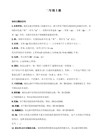
Remember to do --- 记得要去做某事(该事情还没开始做)
Remember doing --- 记得做过某事(该事情已经作了)
Forget to do --- 忘记去做某事(该事情还没做)--- 例如:Don’t forget to bring my book.
Forget doing --- 忘记已经做过的某事 (例如:I cannot forget seeing your friend.)
例如: Tom planned not to do it with him.
动Hale Waihona Puke –ing形式: V+ing功能:正在进行, 主动,强调动作频率大(常常如此)
1, 动词 –ing作主语:
Swimming is a good sport.
2, 动词 –ing 作宾语:
遇到enjoy,finish, keep, mind,practice等词语,后面直接加V+ing作宾语
3, 动词不定式作表语:
My job is to serve you well. --- 主系表结构,表语除了可以用名词,形容词外,还可以有to do不定式。
4, 动词不定式表示目的:
He will go to the shop to buy some food. to buy some food 就是表示目的。
5, 不带to 的动词不定式:
当遇到help, have, let, make等词, 后接的不定式需要省略to,但注意这里任然是不定式结构。 例如:It will make you feel better. I will help you repair your desk.
动词后面接动名词ing的情况和接不定式to do 的情况归类
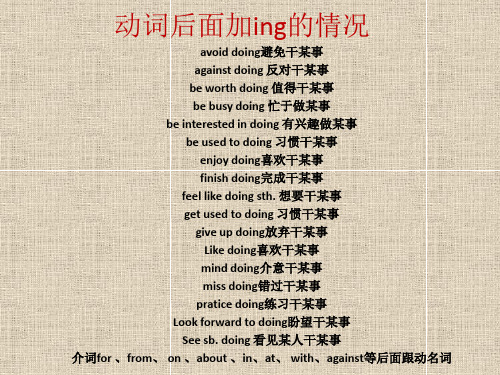
跟ቤተ መጻሕፍቲ ባይዱ练习:
• 1、I enjoy spending time _____(swim)in my spare time. • 2、I don’t feel like ____( walk ) very much today. • 我今天不太想散步. • 3、The report is worth _____(listen)to. • 4、I really thank my parents for ______( 支持)my idea. • 5、I’m gradually getting used to _____(eat)with chopsticks. • 6、They have nothing against ______(play)football agter class. • 7、On my way home,I saw some old people ____(fish)by the sea.
动词后面加ing的情况
avoid doing避免干某事 against doing 反对干某事 be worth doing 值得干某事 be busy doing 忙于做某事 be interested in doing 有兴趣做某事 be used to doing 习惯干某事 enjoy doing喜欢干某事 finish doing完成干某事 feel like doing sth. 想要干某事 get used to doing 习惯干某事 give up doing放弃干某事
_____(watch) TV.
• Too…to 太……而不能…… • It is too heavy to carry. • He is too scared to swim in the river. 练习: English is too difficult for Ling Ling_____(learn).
能带不定式和ing的动词
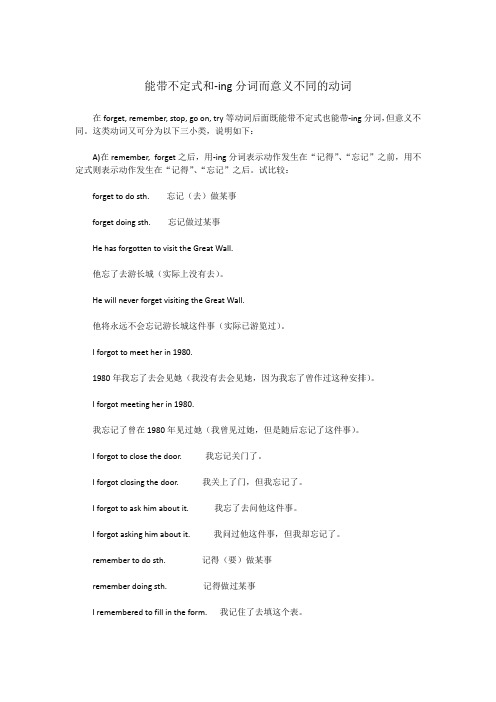
能带不定式和-ing分词而意义不同的动词在forget, remember, stop, go on, try等动词后面既能带不定式也能带-ing分词,但意义不同。
这类动词又可分为以下三小类,说明如下:A)在remember, forget之后,用-ing分词表示动作发生在“记得”、“忘记”之前,用不定式则表示动作发生在“记得”、“忘记”之后。
试比较:forget to do sth. 忘记(去)做某事forget doing sth. 忘记做过某事He has forgotten to visit the Great Wall.他忘了去游长城(实际上没有去)。
He will never forget visiting the Great Wall.他将永远不会忘记游长城这件事(实际已游览过)。
I forgot to meet her in 1980.1980年我忘了去会见她(我没有去会见她,因为我忘了曾作过这种安排)。
I forgot meeting her in 1980.我忘记了曾在1980年见过她(我曾见过她,但是随后忘记了这件事)。
I forgot to close the door. 我忘记关门了。
I forgot closing the door. 我关上了门,但我忘记了。
I forgot to ask him about it. 我忘了去问他这件事。
I forgot asking him about it. 我问过他这件事,但我却忘记了。
remember to do sth. 记得(要)做某事remember doing sth. 记得做过某事I remembered to fill in the form. 我记住了去填这个表。
I remembered filling in the form. 我记得我曾经填写过这个表。
I remember to post your letter. 我记着给你去邮信。
动词的 -ing形式与动词的搭配问题
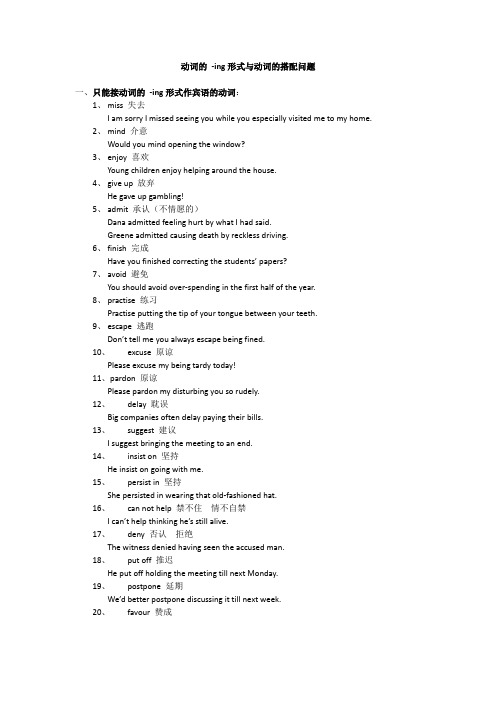
动词的-ing形式与动词的搭配问题一、只能接动词的-ing形式作宾语的动词:1、miss 失去I am sorry I missed seeing you while you especially visited me to my home.2、mind 介意Would you mind opening the window?3、enjoy 喜欢Young children enjoy helping around the house.4、give up 放弃He gave up gambling!5、admit 承认(不情愿的)Dana admitted feeling hurt by what I had said.Greene admitted causing death by reckless driving.6、finish 完成Have you finished correcting the students’ papers?7、avoid 避免You should avoid over-spending in the first half of the year.8、practise练习Practise putting the tip of your tongue between your teeth.9、escape 逃跑Don’t tell me you always escape being fined.10、excuse 原谅Please excuse my being tardy today!11、pardon 原谅Please pardon my disturbing you so rudely.12、delay 耽误Big companies often delay paying their bills.13、suggest 建议I suggest bringing the meeting to an end.14、insist on 坚持He insist on going with me.15、persist in 坚持She persisted in wearing that old-fashioned hat.16、can not help 禁不住情不自禁I can’t help thinking he’s still alive.17、deny 否认拒绝The witness denied having seen the accused man.18、put off 推迟He put off holding the meeting till next Monday.19、postpone 延期We’d better postpone discussing it till next week.20、favour赞成21、Understand 明白I can understand her wanting to live alone and be independent.22、Risk 冒险I can’t help wondering whether we should risk going without raincoats.23、Keep 保持News of successes keeps pouring in.24、Fancy 想象Sorry, but I don’t fancy going out tonight.25、Endure 容忍忍受The lazy bones didn’t fancy getting up at 4 o’clock every morning.26、Dislike 厌恶I dislike getting up early.27、Consider 考虑He was in low ebbs and considered going away.28、Anticipate期望预料We anticipate hearing from you again.29、Appreciate 感激I really appreciate your telling me that.30、Acknowledge 承认Mr. Smith acknowledged receiving the book.31、Imagine 想象I can’t imagine him knowing all that.32、Advocate 拥护主张He doesn’t advocate getting up too early.33、Facilitate 促进是便利Tape recorder facilitates studying English.34、Involve 包括House-keeping involves cooking, washing dishes, sweeping, and cleaning.35、Resent 厌恶He resented being asked to wait.36、Detest 厌恶She said she had always detested seeing a bull fight.37、Loathe 非常厌恶I’d rather go by sea, I loathe flying.38、Ensure 保证确保I can’t ensure his being there in time.39、Can’t resist 忍不住I can’t resist seeing chocolates.40、Resent 怨恨不快Does he resent my being here?41、Evade 逃避Evade paying taxes42、Mention 介意My wife didn’t mention my writing to my private secretary.43、Forbid 禁止The law forbids selling liquor to minors.44、Contemplate 打算注视I hope you would contemplate coming with us on the trip.45、Defer 暂缓延期They deferred making a decision.46、Recall 回忆记起I can’t recall having met him before.47、Approve 批准同意Exercise 1 Put the verbs in brackets into the correct forms, choosing between the –ing participle and the infinitive:1.He was in low spirits and even considered(go) away.2.The criminal even threatened (murder) the president.3.Practise (put) the tip of your tongue between your teeth and blowing: You will pronounceperfect th’s!4.You must endeavour __________ (explain) yourself more clearly, it is impossible _________(understand) what you are trying _________ (say).5.Bob contemplated _____________ (go) to Africa after graduation.6.I can’t help __________ (wonder) whether we should risk ________ (go) without raincoats.7.Don’t tell me you always escape __________ (be) fined because you have a very fast sportscar!8.Leave off ________ (bite) your nails.9.My mother detested ___________ (go) to classical concerts so I never learned ________(appreciate) classical music until I was old enough ___________ (start) a collection of records.10.He didn’t feel like _________ (work) so he suggested _________ (spend) the day in thegarden.11.You still have a lot _________ (learn) if you’ll forgive my ________ (say) so.12.Tim decided ___________ (put) broken glass on top of his wall ________ (prevent) boys________ (climb) over it.13.You certainly mustn’t miss ________ (see) this wonderful film.14.Do you recollect/recall ___________ (tell) John about the new house?15.The doctor advised ___________ (take) the car.16.I could not imagine that ________ (be) possible.二、即可接动词–ing形式,又可接动词不定式作宾语的动词:(一)接两种形式,意义无太大区别的动词如表示一般行为,用分词结构作宾语为多,如表示特定的活具体的动作,则用不定式作宾语为多。
动词不定式口诀
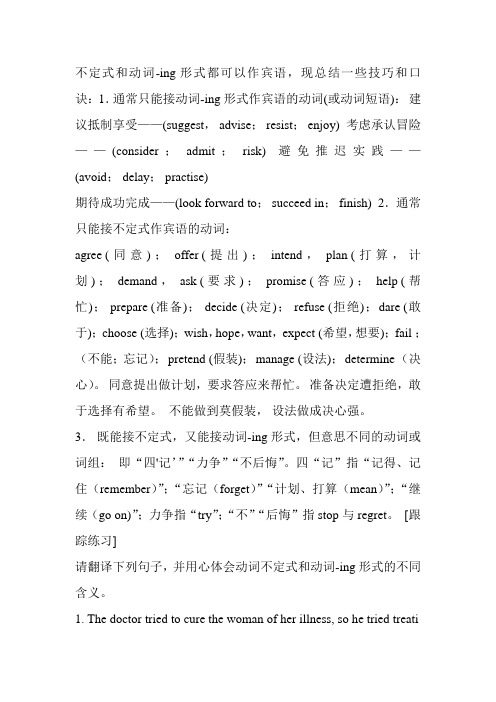
不定式和动词-ing 形式都可以作宾语,现总结一些技巧和口诀: 1.通常只能接动词-ing 形式作宾语的动词(或动词短语):建议抵制享受——(suggest, advise; resist; enjoy) 考虑承认冒险——(consider; admit; risk) 避免推迟实践——(avoid; delay; practise)期待成功完成——(look forward to; succeed in; finish) 2.通常只能接不定式作宾语的动词:agree (同意); offer (提出); intend, plan (打算,计划); demand, ask (要求); promise (答应); help (帮忙); prepare (准备); decide (决定); refuse (拒绝);dare (敢于); choose (选择); wish,hope,want, expect (希望,想要); fail ;(不能;忘记); pretend (假装); manage (设法); determine (决心)。
同意提出做计划,要求答应来帮忙。
准备决定遭拒绝,敢于选择有希望。
不能做到莫假装,设法做成决心强。
3.既能接不定式,又能接动词-ing 形式,但意思不同的动词或词组:即“四'记’”“力争”“不后悔”。
四“记”指“记得、记住(remember)”;“忘记(forget)”“计划、打算(mean)”;“继续(go on)”;力争指“try”;“不”“后悔”指stop与regret。
[跟踪练习]请翻译下列句子,并用心体会动词不定式和动词-ing 形式的不同含义。
1. The doctor tried to cure the woman of her illness, so he tried treating her with a new medicine.2. The teacher asked us to go on reading the text instead of going on to do the exercises.3. What a poor memory! I forgot borrowing money from him yesterd ay. But today I forgot to return the money to him again.4. When the teacher said angrily, “Stop talking, children”, the pupils stopped to write their compositions.5. I regretted to tell him that he had been dismissed. To my surprise, he said to me, “I am not sad, I only regret having taken the wrong jo b.”6. — Remember to return the bat to me. — But I remember hav ing returned it to you.1.医生千方百计来治这位妇女的病,为此他尝试用一种新药来为她治疗。
love加动词的什么形式

love加动词的什么形式?
在英语中,“love”是一个动词,通常表示“喜欢”或“爱”的情感。
作为动词使用时,它后面通常接动词的不定式形式(即“to + 动词原形”)或接动名词形式(即“ing”形式)。
1、不定式形式:当你想要表达“喜欢做某事”或“爱做某事”时,可以使用不定式形式。
例如:
1.I love to read.(我喜欢阅读。
)
2.She loves to dance.(她喜欢跳舞。
)
2、动名词形式:当你想要描述一个人持续的、习惯性的行为或爱好时,可以使用动名词形式。
例如:
1.I love reading.(我喜欢阅读。
)
2.They love swimming.(他们喜欢游泳。
)
需要注意的是,虽然“love”后面可以接动词的这两种形式,但在不同的语境和表达中,选择哪种形式会有所不同。
不定式形式更多地用于表达一次性的、特定的行为或活动,而动名词形式则更常用于描述一种持续的习惯或爱好。
此外,“love”还可以作为名词使用,表示“爱”的情感或状态。
在这种情况下,它通常会与形容词、名词或其他修饰语一起使用,来描述这种爱的性质或对象。
例如:
The love between them was deep and true.(他们之间的爱是深厚而真挚的。
)
总之,“love”加动词的形式取决于你想要表达的具体内容和语境。
通过选择适当的形式和搭配,你可以更准确地传达你的意图和情感。
初中英语_动词ing_动词不定式及动词原形

• ★It’s one’s turn to do sth. 轮到某人做某事 轮到你擦黑板了。 It’s your turn to clean the blackboard. • ★It’s time (for sb.) to do sth. It’s time for you to say sorry. • ★It’s +adj. for/of sb. to do sth. 对于某人来 说做某事是…… It’s so kind of you to help me. • ★ It takes sb. sometime to do sth. 某人做 某事花了某时间
接动词原形的搭配
• make sb do sth 让某人做某事 • notice sb do sth注意到某人做某事 我注意到Susan今天没来学校。 I noticed Susan not come to school today. • let sb do sth 让某人做某事 • have sb do sth 让/使某人做某事 老师让Susan去扫教室。 The teacher has Susan clean the classroom. • help sb do (to do) sth帮助某人做某事
• ★迫不及待做某事can’t wait to do • ★准备做某事get/be ready to do 我准备好考试了。 I am ready to take the test. • ★尽力/努力做某事try to do sth • ★计划做某事plan to do sth. • ★不得不have to do • ★轮流做某事take one’s turns to do sth. We take turns to clean the classroom. • ★告诉某人做某事tell sb. to do sth. • ★请某人做某事ask sb. to do sth.
- 1、下载文档前请自行甄别文档内容的完整性,平台不提供额外的编辑、内容补充、找答案等附加服务。
- 2、"仅部分预览"的文档,不可在线预览部分如存在完整性等问题,可反馈申请退款(可完整预览的文档不适用该条件!)。
- 3、如文档侵犯您的权益,请联系客服反馈,我们会尽快为您处理(人工客服工作时间:9:00-18:30)。
只能接-ing形式的35动词和短语一、用法归纳有的动词或短语动词后只能用动名词而不能接不定式。
如allow, permit(允许), consider(考虑), suggest, advice(建议), finish(完成), imagine(想象), practise(练习), understand(明白), appreciate, enjoy(喜欢), miss(错过; 怀念), prevent(阻止), forbid(禁止), escape(避免), include(包括), forgive, pardon, excuse(原谅), dislike(厌恶), discuss(讨论),report(报道), admit(承认), mind(介意), risk(冒险), can’t stand(不能忍受), burst out(突然开始), feel like(想要), insist on(坚持), delay, put off(推迟), give up(放弃), be busy(忙于), be worth(值得)等。
二、考题分析1. Do you mind ________ alone at home? (上海卷)A. Jane leavingB. Jane having leftC. Jane’s being leftD. Jane to be left【分析】答案选C。
mind后只能接-ing形式,且Jane与leave是被动关系。
2. The squirrel was so lucky that it just missed ________. (全国卷)A. catchingB. to be caughtC. being caughtD. to catch【分析】答案选C。
miss后只能接动名词,且it(the squirrel)与catch是被动关系。
3. I would appreciate ________ back this afternoon. (全国卷)A. you to callB. you callC. your callingD. you’re calling【分析】答案选C。
appreciate后只能接动名词,your是其逻辑主语。
4. —What do you think of the book?—Oh, excellent. It’s worth ________ a second time. (全国卷)A. to readB. to be readC. readingD. being read【分析】答案选C。
在be worth后只能接doing,且用主动形式表示被动含义。
5. The man insisted ________ a taxi for me even though I told him I lived nearby. (江苏卷)A. findB. to findC. on findingD. in finding【分析】答案选C。
insist后接that从句,或者接on sth. 或on doing sth. ,没有别的接法。
insist on doing坚持要做某事。
6. He has always insisted on his ________ Dr Turner instead of Mr. Turner. (上海卷)A. been calledB. calledC. having calledD. being called【分析】答案选D。
在insist on后只能接-ing形式。
只能后接不定式的35动词和短语一、只能后接不定式的动词和短语归纳有的动词后只能用不定式而不能接动名词。
如ask, demand(要求), plan, intend, mean(计划), manage, do / try one’s best, make an attempt, (努力), learn(学习), wish, hope, desire, expect, long, want, would like, should like, would prefer(), wish,希望、愿意), agree, promise(同意), decide, determine, choose, make a decision, make up one’s mind(决定), offer(主动提出), apply(申请), help(帮助), fail(不能、没有), prepare(准备), pretend(假装), refuse(拒绝), happen(碰巧), afford(负担得起)等。
二、只能后接不定式的动词和短语考题1. We agreed ________ here but so far she hasn’t turned up yet. (全国卷)A. having metB. meetingC. to meetD. to have met【分析】答案选C。
agree只能接不定,在谓语动之后发生,用一般式。
2. She pretended ______me when I passed by. (全国卷)A. not to seeB. not seeingC. to not seeD. having not seen【分析】答案选A。
pretend只能接不定式,not要放在不定式的前面构成否定。
既可接不定式又可接动名词作宾语的动词一、后接不定式或动名词且含义相同的动词这类动词常见的有:like 喜欢/ love 喜欢/ hate 憎恨/ prefer 宁可/ begin 开始/ start 开始/ continue 继续/ can’t bear 不能忍受/ bother 麻烦/ intend 想要/ attempt 试图/ cease 停止,等。
如:He likes travelling [to travel] alone. 他喜欢单独旅行。
He began doing [to do] this job last year. 他去年开始做这工作。
Don’t bother to get [getting]dinner for me. 请不必费事为我做饭了。
注意:当like, love, hate, prefer 与would, should 连用时,其后只能接不定式。
如:I’d like to drop in and see you tonight. 我想今晚来看你。
另外,当begin, start 本身为进行时态或后接know, realize, understand 等静态动词时,其后的动词只能用不定式。
如:He is beginning to work in that company. 他即将开始去那个公司工作。
After the talk with his English teacher, he began to like English. 跟英语老师谈话之后,他开始喜欢英语了。
二、forget, remember, regret 后接不定式或动名词含义不同后接不定式或动名词含义不同动词forget, remember, regret 等接不定式时,表示非谓语动词的动作发生于谓语动词的动作之后;接动名词作宾语时,表示非谓语动词的动作发生于谓语动词的动作之前。
如:I forgot to tell you about it. 我忘记告诉你那件事了。
I remembered giving the book to Li Lei, but he said I didn’t. 我记得我把书给李蕾了,但是他说我没有给。
此外,动词forget, remember, regret 等接动名词、接动名词的完成式或不定式的完成式作宾语时,意义相同。
如:I regretted to have broken the rules of our class. = I regretted having broken the rules of our class. 我后悔违反了班规。
三、mean后接不定式或动名词含义不同动词mean 接不定式作宾语时,表示一种意图,意思是“打算做,想要做”;接动名词作宾语时,表示解释,意思是“意味着,意思是”。
如:”I didn’t mean to bother you. 我本不想打扰你。
What he said means going there by air. 他的话的意思是坐飞机去那儿。
四、try后接不定式或动名词含义不同try 接不定式作宾语时,表示一种决心,意思是“设法做,尽力做”;接动名词作宾语时,表示尝试,意思是“试着做”。
如:I’ll try to catch up with my class. 我将尽力赶上同学们。
I tried reading the text without consulting my dictionary. 我试着不查词典来阅读课文。
五、need, require, want, deserve后接不定式或动名词语态不同need, require, want, deserve 等表示“需要”的动词后另一动词作宾语时,该动词用不定式或动名词均可,但是其语态不同,即动名词用主动形式表示被动意义,而不定式则用被动形式表示被动意义。
如:The flowers need watering every day. = The flowers need to be watered every day. 花儿需要每天浇水。
注意:若need, require, want后接动词为句子主语所发出的动作,则只能用不定式,不能用动名词。
如:I need to water the flowers every day. 我需要每天给花浇水。
六、can’t help后接不定式或动名词含义不同can’t help 后接不定式时,意思是“不能帮忙做某事”;接动名词作宾语时,意思是“禁不住做某事,情不自禁做某事”。
如:I’m very busy now, so I can’t help (to) clean the room. 我现在很忙,因此不能帮助打扫房间。
The girl couldn’t help crying when she saw her mother again. 当小女孩再次看到母亲时,她情不自禁地哭了起来。
说明:以下两个动词后接不定式或动名词(不一定是用作宾语)意思也不同:go on to do sth (做完某事后)继续做另一事) (不定式作状语)go on doing 继续做一直在做的事(动名词作状语)stop to do sth 停下正在做的事以便去做另一事(不定式作状语)stop doing sths) 停做正在做的事(动名词作宾语。
